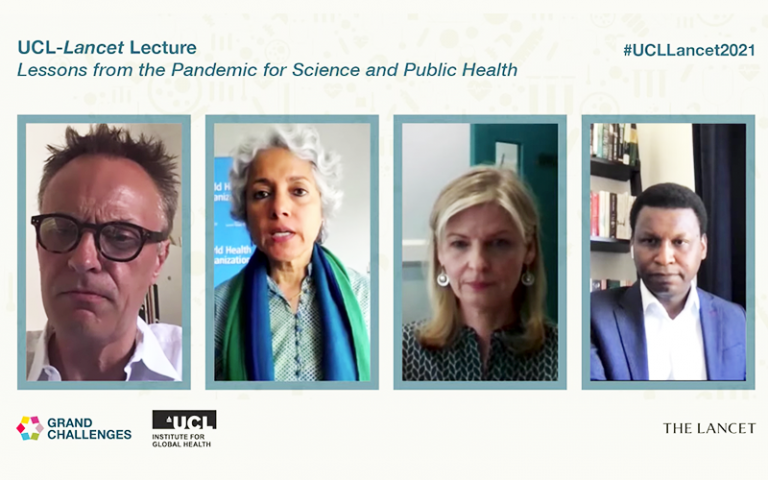UCL and WHO scientists urge nations to collaborate for vaccine equity
10 June 2021
Leading UCL academics joined Dr Soumya Swaminanthan, the World Health Organisation’s (WHO) Chief Scientist for this year’s UCL-Lancet lecture in a seminal event to discuss the role of science in responding to the COVID-19 pandemic.

Dr Swaminathan said it was “urgent that vaccine dose sharing must happen immediately” and highlighted the importance of a strengthened international effort to combat COVID-19 and work towards vaccine equity.
Dr Swaminathan also stressed the need to tackle the accompanying “infodemic” that has emerged from COVID-19, particularly regarding its effects on vaccine hesitancy.
Professor Alison Rodger from UCL’s Institute for Global Health (IGH) and Professor Ibrahim Abubakar, UCL IGH Director and incoming Dean of the Faculty of Population joined the panel, hosted by The Lancet’s editor-in-chief, Dr Richard Horton to emphasise that the pandemic is far from over with most people in the world yet to receive a vaccination.
The panel urged richer countries to strongly support global vaccination strategies and initiatives such as COVAX to help fight the spread of the virus and potential emerging new variants around the world.
In her response to the keynote, Professor Alison Rodger (UCL Institute for Global Health) praised the healthcare community and the scientific community for their unprecedented advances in scientific knowledge, therapeutics, and in particular the speed of vaccine development. She also called for health care workers to be better protected globally through vaccination so those in low-income settings can benefit from the same protection as those in resource rich settings.
“It is estimated that while resource rich countries have 1 billion more doses of vaccine than they need, more than 100 countries, with 2 billion people, have yet to administer a single dose of vaccine. Countries with lack of access to high levels of vaccine coverage will remain trapped by recurrent waves of infection that overwhelm fragile heath infrastructures and cause high mortality rates especially among the elderly and those with co-morbidities, but also among health care workers who are at high risk of both acquiring and transmitting the virus.
“To do this, vaccine production needs a step-function increase. Transferring technologies and stepping up production globally will require unprecedented global collaboration and co-ordination in which the WHO and Dr Swaminathan will play a leading role.”
Professor Abubakar closed the session saying it was not too late to allow science to underpin global solidarity. “I'd like to use this platform to appeal to our political leaders to make global Britain more than just rhetoric by sharing our vaccine stock and resources with countries that are currently experiencing outbreaks. We still have a chance to demonstrate global moral and health leadership.”
Introduced by UCL’s President & Provost, Dr Michael Spence, over 1,000 listeners from around the world were in the online audience for this year’s annual lecture. Hosted by UCL Grand Challenges, UCL IGH and world-renowned medical journal The Lancet, the event was held digitally for the second year in a row and is now available to watch on YouTube.
Links
- Watch the UCL-Lancet Lecture 2021
- Dr Soumaya Swamanithan’s profile
- Dr Richard Horton’s profile
- Professor Ibrahim Abubakar’s academic profile
- Professor Alison Rodger’s academic profile
- UCL Institute for Global Health
- UCL Grand Challenges
- The Lancet
- World Health Organization
Image
Caption: The UCL-Lancet Lecture 2021 panel
 Close
Close

